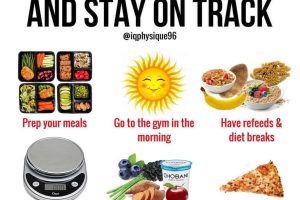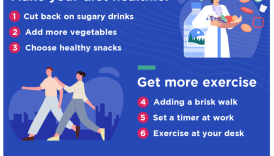How to Stay on Track with Your Healthy Living Diet

Importance of a Healthy Living Diet
Embracing a healthy living diet is crucial for enhancing overall well-being. It is not just about looking good; it fundamentally impacts how one feels and functions daily. For instance, when Jane switched to a more balanced diet, she noticed an increase in her energy levels and improved her mood significantly. A healthy diet can lead to numerous benefits, including:
- How to Stay on Track with Your Healthy Living Diet
- Importance of a Healthy Living Diet
- Setting Your Goals
- Understanding Your Dietary Needs
- Establishing Realistic Objectives
- Planning Your Meals
- Creating a Balanced Meal Plan
- Shopping Smart
- Making Healthier Food Choices
- Preparing Nutritious Meals
- Cooking Techniques for Healthy Eating
- Avoiding Temptations
- Strategies for Resisting Unhealthy Foods
- Staying Hydrated
- Benefits of Drinking an Adequate Amount of Water
- Incorporating Physical Activity
- Finding an Exercise Routine That Works for You
- Monitoring Your Progress
- Tracking Your Food Intake and Exercise
- Seeking Support
- Building a Support System
- Consulting with a Healthcare Professional
- Overcoming Challenges
- Dealing with Setbacks
- XII. Celebrating Successes
- Rewarding Yourself for Achievements
- Improved Energy Levels: Nutrient-rich foods help maintain stamina throughout the day.
- Better Mental Health: Foods high in omega-3 fatty acids, like fish, can boost mood and cognitive function.
- Weight Management: A balanced diet can help control weight effectively.
Ultimately, adopting healthier eating habits can pave the way for a longer, more fulfilling life, allowing everyone to enjoy activities that matter most.
Setting Your Goals
Understanding Your Dietary Needs
To truly thrive on your healthy living journey, it’s essential to first understand your dietary needs. Each individual requires a unique blend of nutrients based on factors such as age, activity level, and health goals. For example, when Mike examined his lifestyle, he realized he needed more protein to support his training schedule. Consider these questions to tailor your diet:
- What are your health goals? (e.g., weight loss, muscle gain, improved digestion)
- Do you have any dietary restrictions? (e.g., allergies, intolerances)
- What types of foods do you prefer or dislike?
Establishing Realistic Objectives
Once you’ve identified your dietary needs, the next step is setting realistic objectives. Aim for small, achievable goals rather than drastic changes. For instance, instead of overhauling your entire diet overnight, start by:
- Adding one serving of vegetables to each meal
- Drinking an extra glass of water daily
- Trying a new healthy recipe each week
These incremental changes make your journey sustainable and enjoyable, paving the way toward long-term success.
Planning Your Meals
Creating a Balanced Meal Plan
Having established your dietary needs and realistic objectives, it’s time to dive into meal planning. Creating a balanced meal plan serves as a roadmap for healthy eating, making it easier to stick to your goals. For instance, when Anna started meal prepping, she found that it saved her time and reduced impulse eating. To create a balanced meal plan, consider the following components:
- Fruits and Vegetables: Aim for half your plate to be filled with colorful produce.
- Proteins: Include lean sources like chicken, fish, beans, and tofu.
- Whole Grains: Incorporate whole grains like brown rice, quinoa, and oats for sustained energy.
- Healthy Fats: Don’t forget about healthy fats from avocados, nuts, and olive oil.
Organize your meals for the week by creating a simple table or chart. This approach not only ensures variety but also keeps you excited about what’s on your plate!
Shopping Smart
Making Healthier Food Choices
Now that you have a balanced meal plan ready, the next step is to hit the grocery store with purpose. Shopping smart can significantly influence your healthy eating journey. For instance, when Tom decided to shop with a list based on his meal plan, he discovered how it kept him focused and minimized unhealthy impulse buys. Here are some tips for making healthier food choices while shopping:
- Stick to the Perimeter: Most grocery stores have fresh produce, meats, and dairy along the outer aisles—these are usually healthier options.
- Read Labels: Pay attention to ingredient lists and nutritional information. Look for foods with fewer added sugars and artificial ingredients.
- Choose Seasonal Produce: Seasonal fruits and vegetables are often fresher and more nutritious, not to mention more budget-friendly.
By planning your shopping trip effectively, you’ll set yourself up for success as you prepare nutritious meals throughout the week.
Preparing Nutritious Meals
Cooking Techniques for Healthy Eating
With your ingredients in hand, it’s time to transform them into delicious, nutritious meals. The way you cook can greatly influence the health benefits of your food. Jamie, for example, found that simple adjustments in her cooking methods made a significant difference in her meals’ nutritional value. Here are some healthier cooking techniques to consider:
- Steaming: This method retains more nutrients compared to boiling, making it ideal for vegetables.
- Grilling or Baking: Both methods allow you to use less fat while enhancing flavor. Grilled chicken or baked salmon are great options.
- Sautéing with Healthy Oils: Opt for olive or avocado oil to limit unhealthy fats while adding flavor.
Incorporating these techniques not only helps in preserving nutrients but also encourages creativity in the kitchen. Trying new recipes can make cooking a fun experiment rather than a chore!
Avoiding Temptations
Strategies for Resisting Unhealthy Foods
Even the best meal plans can be derailed by cravings for unhealthy foods. To stay on track, it’s essential to arm yourself with effective strategies. When Sarah faced late-night snack cravings, she discovered that having a plan helped her resist temptation much more effectively. Here are some practical strategies to consider:
- Keep Unhealthy Snacks Out of Sight: If they’re not readily available, you’ll be less likely to indulge. Stock your pantry with nutritious alternatives like nuts or fruit.
- Stay Hydrated: Sometimes, cravings can be mistaken for thirst. Drinking water can reduce those urges and keep you feeling satisfied.
- Practice Mindful Eating: Focus on the flavors and textures of your food. This mindfulness can help you appreciate your healthy meals and reduce cravings for junk food.
By implementing these strategies, you’ll create a supportive environment that encourages healthier choices, helping to keep those temptations at bay!
Staying Hydrated
Benefits of Drinking an Adequate Amount of Water
Staying hydrated is a crucial aspect of maintaining a healthy lifestyle, often overlooked in the midst of meal planning and preparation. When Alex started tracking his water intake, he was amazed at how much it improved his overall energy levels and focus throughout the day. Here are some notable benefits of drinking enough water:
- Boosts Energy Levels: Dehydration can lead to fatigue; staying hydrated helps you feel more alert and lively.
- Supports Digestion: Adequate water intake aids in the breakdown of food, promoting better digestion and nutrient absorption.
- Helps with Weight Maintenance: Sometimes, the body confuses thirst with hunger. Drinking water can curb unnecessary snacking and help regulate appetite.
By prioritizing hydration, you can enhance your well-being and support your body’s essential functions, making every moment of your healthy living journey more enjoyable!
Incorporating Physical Activity
Finding an Exercise Routine That Works for You
As you focus on nutrition and hydration, integrating physical activity is essential for a well-rounded healthy lifestyle. When Brian began his fitness journey, he discovered that finding an exercise routine he enjoyed made all the difference in maintaining his commitment. Here are some tips for creating an exercise routine that suits your lifestyle:
- Identify Your Interests: Whether it’s dancing, hiking, cycling, or yoga, choose activities that excite you. A fun workout is more sustainable!
- Set Realistic Goals: Start with achievable objectives, such as aiming for 20 minutes of activity three times a week, and gradually increase as you gain confidence.
- Mix It Up: Incorporate a variety of exercises, such as strength training, cardio, and flexibility workouts. This not only keeps things interesting but also enhances overall fitness.
By personalizing your exercise routine, you’ll foster a positive relationship with physical activity, ultimately enhancing your health and happiness on this journey!
Monitoring Your Progress
Tracking Your Food Intake and Exercise
To ensure that your healthy living journey is on the right track, monitoring your progress is crucial. When Lisa started keeping a food and exercise journal, she was surprised at how much it helped her stay accountable and motivated. There are several effective ways to track your food intake and exercise:
- Use Smartphone Apps: Many apps allow you to log your meals and workouts, making it easy to see trends over time. Popular options include MyFitnessPal and Lose It!
- Keep a Journal: Write down what you eat and your exercise sessions daily. This can help identify patterns and areas for improvement.
- Set Check-in Dates: Evaluate your progress weekly or monthly to celebrate achievements and adjust your plans if necessary.
By monitoring your actions, you’ll gain insight into your progress and remain committed to your goals, making adjustments as needed for continued success!
Seeking Support
Building a Support System
As you navigate your healthy living journey, having a support system can make a world of difference. When Mia decided to lose weight, she found that sharing her goals with friends not only motivated her but also created a sense of accountability. To build a strong support network, consider the following:
- Talk to Friends and Family: Share your health goals with loved ones who can encourage you along the way.
- Join a Group: Look for community fitness classes or online forums where you can connect with like-minded individuals who share your goals.
- Find a Workout Buddy: Exercising with a friend can make your workouts more enjoyable and help keep you committed.
Consulting with a Healthcare Professional
In addition to building a support network, consulting with a healthcare professional can provide tailored advice and guidance. A registered dietitian or nutritionist can help you create a customized meal plan, while a personal trainer can optimize your workout routine. These professionals can:
- Identify Your Unique Needs: Understanding your specific health conditions and dietary requirements helps in crafting effective plans.
- Monitor Progress: Regular check-ins can provide motivation and adjustments as necessary.
With a solid support system and professional guidance, you’ll be well-equipped to tackle challenges and celebrate your successes on this health journey!
Overcoming Challenges
Dealing with Setbacks
Every journey to healthier living comes with its share of challenges, and setbacks are a common part of the process. When Tyler faced a plateau in his weight loss, he initially felt discouraged, but he soon learned strategies to overcome it. Here are some impactful ways to handle setbacks effectively:
- Reassess Your Goals: Sometimes, goals need adjustment. If you’re not getting the results you want, it might be time to modify your approach.
- Practice Self-Compassion: Remember that setbacks are normal. Instead of dwelling on failures, focus on the progress you’ve already made.
- Learn from Experience: Analyze what led to the setback. Was it stress, unexpected events, or nutritional choices? Understanding the trigger can help prevent future occurrences.
By embracing setbacks as opportunities for growth, you can strengthen your resilience and continue moving forward on your path to a healthier lifestyle!
XII. Celebrating Successes
Rewarding Yourself for Achievements
As you progress on your healthy living journey, it’s vital to take a moment to celebrate your successes. Recognizing your achievements, big and small, can keep your motivation high and reinforce positive behaviors. When Lisa completed her first month of consistent workouts, she treated herself to a new workout outfit, which boosted her confidence further. Here are some thoughtful ways to reward yourself for your hard work:
- Non-Food Rewards: Treat yourself to a spa day, a new book, or some quality time with friends. Choose rewards that don’t undermine your health goals.
- Set Milestones: Celebrate when you hit significant milestones, like losing a certain number of pounds or completing a specific number of workouts.
- Keep a Journal: Document your achievements and reflect on how far you’ve come, reinforcing your commitment to a healthier lifestyle.
By celebrating your successes, you’ll cultivate a positive mindset that keeps you thriving on your journey and excited for what lies ahead!





